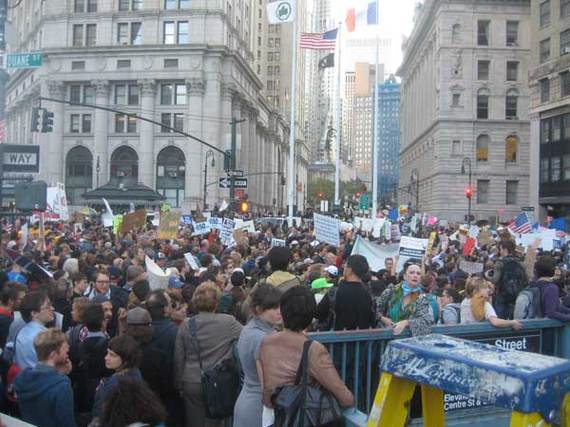I want to talk to you about a dark day in the history of New York City. There have been many dark days in the city's history: You may expect that I am talking about September 11, or of the night of Hurricane Sandy. These were terrible days, but they were caused by events beyond the purview of New York City political policy, and they were also the occasion for acts of great bravery and public spirit.
No, the dark day I want to talk to you about is February 15, 2003, when about 500,000 people tried to march in New York City to demonstrate against plans by the administration of President George Bush to invade Iraq.
That day, there were demonstrations against the invasion plans taking place all over the world. In New York City, plans for a march past the United Nations were thwarted. People came from across the country to march and to hear speeches and share their deep despair over the plans for the war, only to find themselves herded into blocks, unable to move. These block-by-block groupings extended from 72nd street to 49th Streets on First, Second and Third Avenues. In the packed-in crowd were ordinary citizens, including many elderly citizens, as well as families with small children. It was a bitter, cold day with grey skies, to match our despair over the rush to war, and our frustration because we couldn't enjoy our First Amendment rights. In my case, after I had been standing for hours on First Avenue, just South of the Queensborough Bridge, I decided to leave the demonstration with two friends -- all three of us middle aged women, one of us a Buddhist -- and I suddenly found myself at the business end of four horses, moving this way and that way as mounted police were pushing crowds back into the kettled areas, and creating panic in the crowd. The police were the ones creating riot conditions where there were only peaceful, freezing citizens trying to express a political view. And I was just doing what the Mayor and the Police Commissioner wanted me to do, that is give up on the Bill of Rights and go home.
There have been many other dark days like this in the past twelve years. Each person will have a particularly strong memory: For many, the mass arrests of protesters and passersby during the 2004 Republican Convention was one of those dark days, for others, the silent march against Stop and Frisk from Harlem to Mayor Bloomberg's 79th Street mansion stands out, as citizens marched in total silence, legally, but surrounded by heavily armed NYPD -- one friend said she had never seen so many heavy weapons aimed at unarmed New Yorkers. For me, the last straw was a demonstration on October 5, 2011 during the Occupy Wall Street period, when a mass of people found themselves stuck in Foley Square, unable to march the few blocks back downtown to Zuccotti Park, though there were some permits for a limited march. In the weeks before police has been pepper spraying people who were doing nothing, who were just on the sidewalk near a demonstration, so not only was I again deeply physically frustrated not to be able to move, to just go from point A in the city to point B, so that I could listen to a few speeches, but I was afraid of arrest and bodily harm, for doing nothing. Mr. de Blasio, you are six feet, four inches tall, but I am about five feet, three inches tall, and I can assure you that when you are that height, you can't see what has happened to the three people ahead of you. I was afraid that if I so much as stepped from the sidewalk into the street to see what was going on ahead, I might encounter a policeman with the kind of lack of self control which had recently been exhibited by Deputy Inspector Anthony Bologna.
I want to add that, in general, I do not blame most police officers, other than rogue individuals. They are following orders and implementing, more or less enthusiastically, the policy they have been handed. It is the policy itself -- thinking of citizens engaged in political protest or activism as criminals -- which must be changed. That is the political philosophy part of it. But in addition, speaking practically, in all these recent instances, the methods taken to prevent assemblies and marches were much more disruptive, and for longer time periods than it would have been to allow the free flow of a march. Kettling, cuffing with overly tight plastic ties, pepper-spraying unarmed citizens and using horses against people with no place to go, only created the inflamed conditions that the police claimed they wanted to avert.
Further, it is important to note that almost all the cases against such demonstrators, all the arrests, have been thrown out of court, and in many cases, including the brutal incarcerations of protesters and others during the 2004 Republican convention the city, will have to pay millions in damages. So, again, practically speaking, not sensible policy.
People, young and old, who actually care enough about what their government is doing enough to leave the comfort of their homes, to spend a few hours exercising their rights under the Constitution, are not the enemy.
As a New Yorker born and bred, I have many very positive memories of political marches I have been on in New York City, including the million-strong, anti-nuclear demonstration that took place in Central Park and on 5th Avenue on June 12, 1982. We are one of the great cities of the world, in a country that claims to stand for freedom of political and religious expression. Let us turn away from the repression of the past twelve years, and let that great spirit flourish again.
